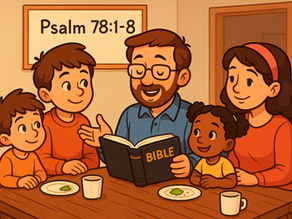Luke 15:11-16 - Prodigious Deprivation
- Chad Werkhoven
- Jan 2
- 4 min read
Updated: Jan 6
Parables are shocking stories with spiritual meanings.
Luke 15:11-17 (NIV)
11 Jesus continued: “There was a man who had two sons. 12 The younger one said to his father, ‘Father, give me my share of the estate.’ So he divided his property between them.
13 “Not long after that, the younger son got together all he had, set off for a distant country and there squandered his wealth in wild living. 14 After he had spent everything, there was a severe famine in that whole country, and he began to be in need. 15 So he went and hired himself out to a citizen of that country, who sent him to his fields to feed pigs. 16 He longed to fill his stomach with the pods that the pigs were eating, but no one gave him anything.
Canons of Dordt
Point 1 - God's Unconditional Election
Article 1 - God's right to condemn all people
Since all people have sinned in Adam
and have come under the sentence of
the curse
and eternal death,
God would have done no one an injustice if it had been his will
to leave the entire human race in sin and under the curse,
and to condemn them on account of their sin.
As the apostle says:
“The whole world is liable to the condemnation of God” (Rom. 3:19),
“All have sinned and are deprived of the glory of God” (Rom. 3:23, NABRE), and
“The wages of sin is death” (Rom. 6:23).
Summary
Often times 'parables' get defined as 'earthly stories with heavenly meanings.' That's not a terrible definition, but perhaps they're better understood as 'shocking stories with spiritual meanings.' Jesus included shocking elements in these stories intended to stun His listeners and grab their attention.
This first half of one of Jesus' most famous parables gives two good examples of details that would have shocked those first century "tax collectors and sinners who all gathered around to hear Jesus" respond to the Pharisees who scolded Jesus for having fellowship with such sinners (v1-2).
Jesus begins the parable with the younger son's shocking demand that his father fork over half of his estate. In a sense, the young man told his father to drop dead so he could spend his money. No matter how sinful your audience is, that's a surprising way to begin a story!
The next big shock, perhaps even more so than the first, came when when the now destitute son not only needed to get a job feeding pigs, but when he actually craved the pigs' food. The Jews listening to Jesus couldn't conceive of a more disgusting, unclean animal than pigs. For a prodigious Jewish man (where we get the word 'prodigal') to lower himself so far was Jesus' shocking way of demonstrating what it meant for the man to be in need.
Dig Deeper
We call this confession the Canons of Dordt because it was put together by a gathering (called a synod) of churches in the Dutch city of Dordrecht way back in 1619. Since English tongues have difficulty properly pronouncing Dordrecht, it's been shortened to 'Dordt' (some people make it even simpler and just spell it the way it sounds: Dort). But even though the synod that formulated these canons was held in Holland, the document was written in Latin, not Dutch.
Obviously we're using a modern English translation as we use the Canons for our Bible reading guide this year. But there was one word that captured my attention in today's portion that was different than what I expected. Did you catch it too?
The Canons cited Romans 3:23, which isn't surprising because it's such a foundational verse which we'll look at often this year. But the modern editors simply translated these passages as they were included in the original Latin, so they rendered the verse All have sinned and are deprived of the glory of God, rather than the more familiar fallen short of the glory of God, which almost every English Bible translation uses.
But the original Greek word Paul used lends itself to the understanding that we've deprived ourselves of God's glory in our sin. And that's exactly how Jesus used the very same word as well in the parable of the Prodigal Son: he was in need.
Yes, for sure we've fallen short of God's glory in our sin. That's a good translation and we'll stick to it. But the result of this fall is that man is now deprived / in need of God's glory which you were created to reflect.
We didn't read it today, but of course you know the shocking end of Jesus' parable. The father welcomes his deprived son back and restores the glory he was meant to have. And so it is with your Father when you repent as well.
ACKNOWLEDGE WHO GOD IS: Our Father, whose glory our sin deprives us of;
ALIGN YOUR LIFE WITH GOD'S WILL: Pray that you will reflect the glory your Father has restored to you through Christ;
ASK GOD FOR WHAT YOU NEED:
Read the New Testament in a year! Today: Mark 2




















I appreciated the questions for thought and comment you added a few days ago. Will you do that more often please?